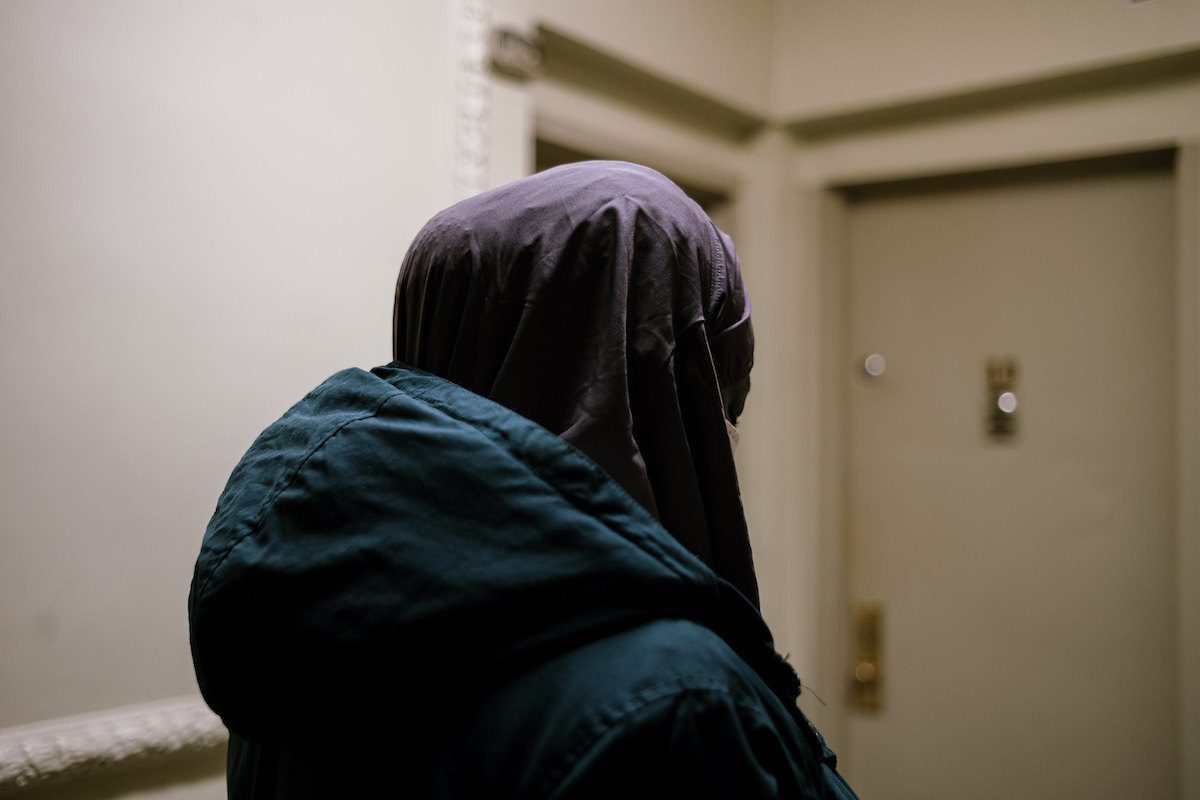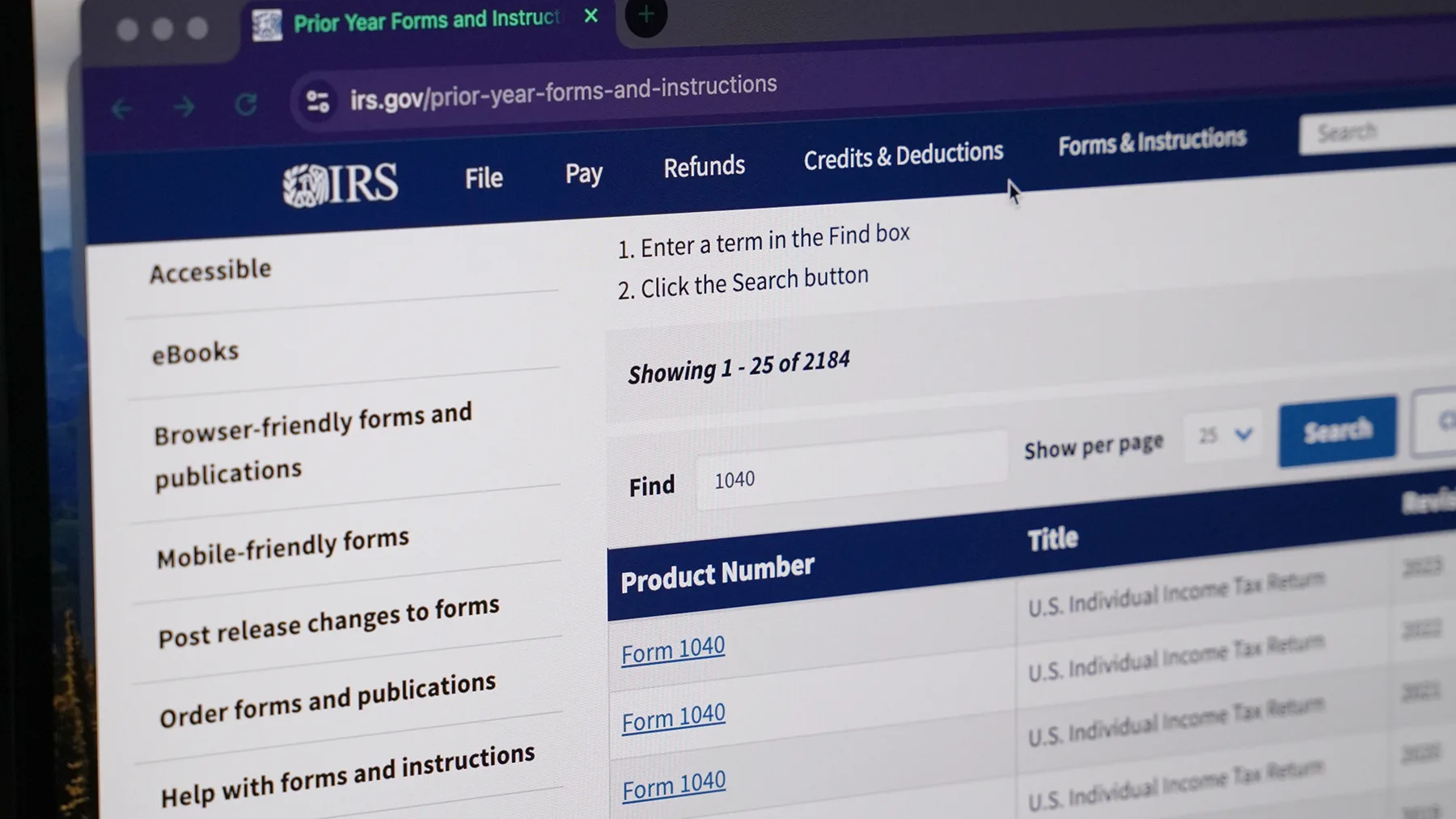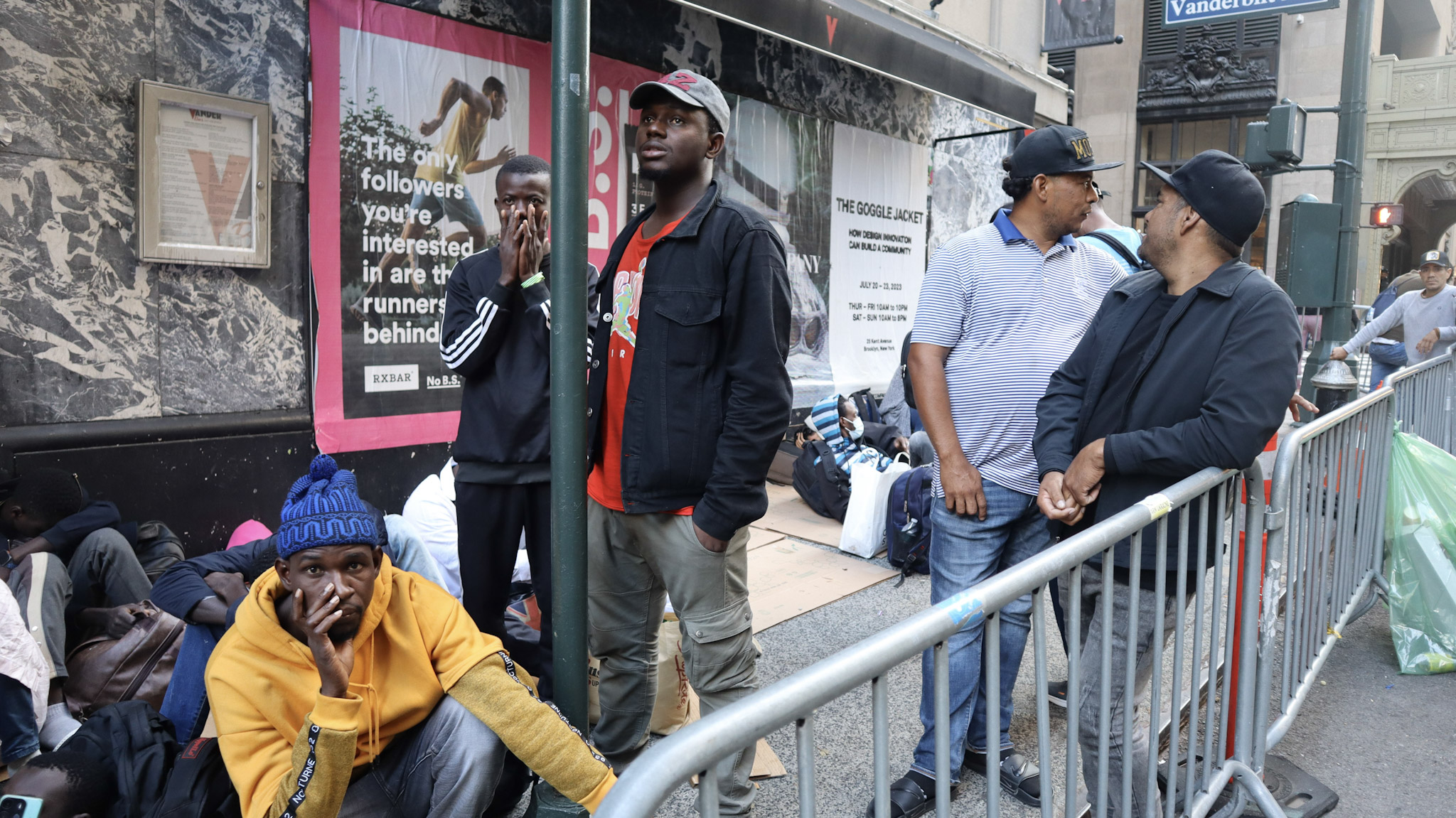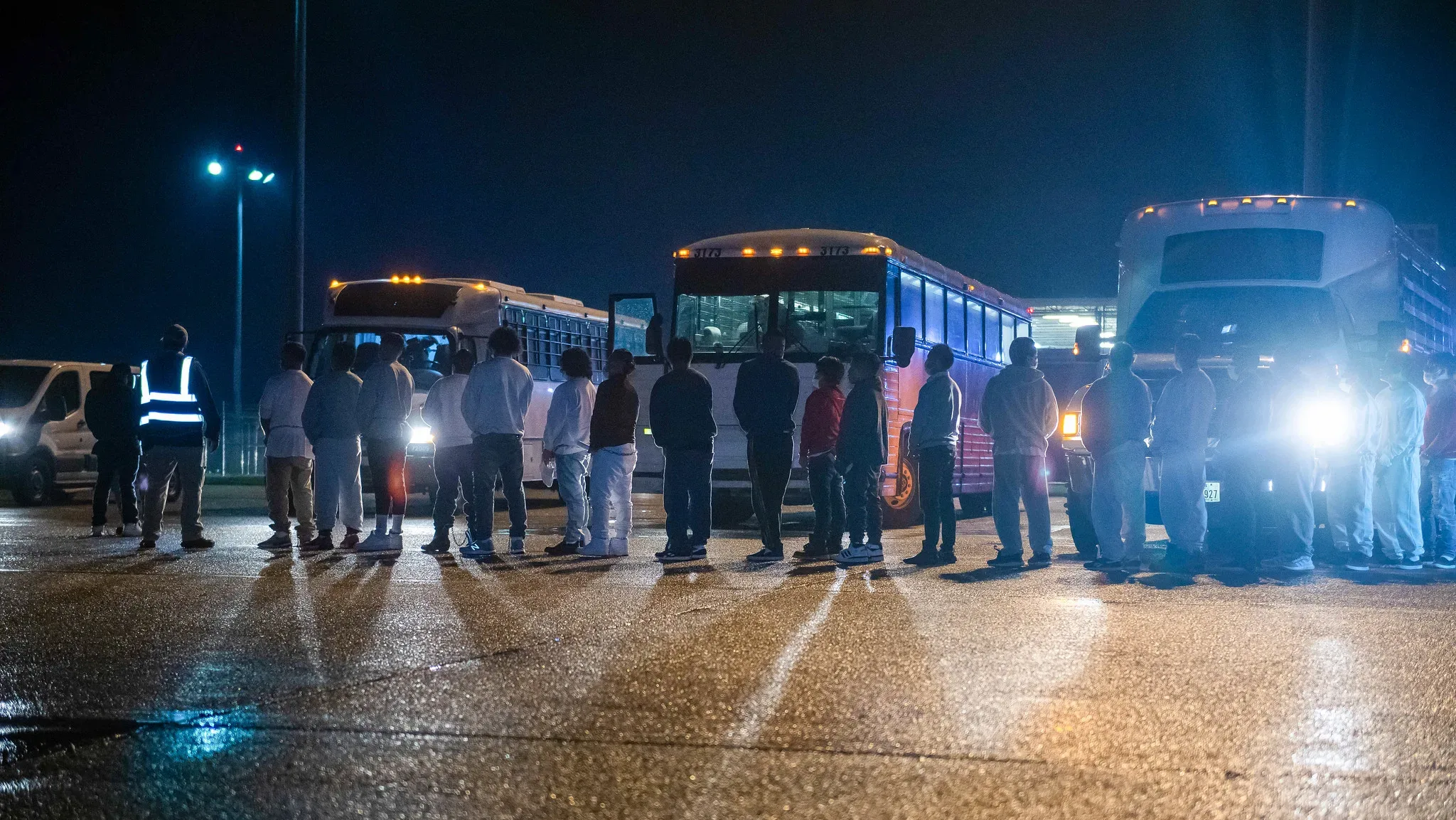Fatma* followed a group of FBI agents through a maze of tunnels and back doors in a building she had never seen before. She had lived in New York City for a year and a half and had not explored much since her arrival. “I didn’t know anything other than my house, mosque and the market,” Fatma explained.
The agents brought Fatma to a small jail cell. “Am I dreaming?” she thought.
She sat in the cell for hours, looking at the walls and the toilet seat. It was freezing. She thought about what had just happened.
In October 2015, Fatma woke in her Bronx apartment to banging on the door before the crack of dawn. “Open up, open up!” she heard. She was not concerned. A few days earlier the police had come banging on the door looking for a man who did not live there. This was probably another case of mistaken identity, she thought, and went back to sleep.
One of the other families who lived in this three-bedroom apartment eventually opened the door. Fatma heard footsteps charging through the apartment and saw the glow of flashlights creeping under her door. Suddenly, one of the officers barged in.
“Wait! Can I put my headscarf on?” said Fatma, a Ghanian immigrant. The officer now in her room wouldn’t let her, but she insisted. He told her he would grab it for her. Fatma, looking squarely at the gun on his hip, relented.
The officer lined up everyone who lived in the apartment. Fatma, her husband and their newborn shared the space with a woman and her two children and a single man. He asked about their immigration statuses individually, and they all said they had green cards.
“You, you’re illegal, right? You came here legally but you overstayed,” the officer said, pointing at Fatma. Fatma said yes, but tried to explain that she and her husband were in the process of rectifying her status. The agent was unmoved.
Shortly after, Fatma’s husband Malik* came home from morning prayer at the mosque and found at least 10 agents were now at the apartment. He was told to sit down, and then the agents asked if his wife was in the U.S. legally. He explained that he had a green card and was planning on sponsoring his wife, but at this moment, she was without status.
Fatma didn’t know at the time, but this visit would be the beginning of a long relationship with the Federal Bureau of Investigation. Over the next four years, agents would dangle the prospect of immigration relief in front of Fatma if she acted as an FBI informant — a tactic that has been deployed against Muslim immigrants long before President Donald Trump came into office.
When asked for comment, the FBI’s National Press Office said, “The FBI cannot be of assistance.”
“To me, it was just a dream at that point,” Fatma said when recalling the raid earlier this year. “Until they put handcuffs on me and said we’re going to 26 Federal Plaza.”
The agents gave Fatma time to pump some milk for her one-month-old baby and advised her to get some snacks, because she could be there for hours.
Also Read: NYPD Continues to Focus Surveillance on Muslims
A Day at 26 Federal Plaza
Fatma was brought to a tall, soulless government building in lower Manhattan called 26 Federal Plaza. The public enters through a snaking, tented security area where guards order people to take off their shoes before passing under the metal detectors. Fatma meanwhile was taken into the building through an underground parking lot. In the booming lobby, confused couples searched for the correct floor for their green card interviews while government employees sipped coffee.
The building houses a small jail where Immigration and Customs Enforcement holds people before they are transferred to detention facilities elsewhere. It’s also home to the FBI’s New York field office.
Fatma was held in the building’s jail for hours before she was taken to a private room where agents showed up with a stack of documents. The agents told her she was entitled to a lawyer, but that hiring one would only complicate matters further, she recalled. If she signed this set of documents, they would just ask her a few basic questions and she would be out of there quickly. Fatma wanted to go home, so she signed.
Fatma then faced a rotating cast of agents — men and women, white, Black, and Asian. She was pulled from one room to another; Sometimes there would be seven people questioning her, other times five. Some agents were hostile and threatened to take her child away. Others told her she was doing a great job.
The agents wanted to know if Fatma was in an arranged marriage. She and Malik were married in 2014, and she joined him in the U.S. later. Their marriage was far from arranged, but it was a “long story” how they met, Fatma explained.

They also wanted to know about her days as a student activist in Ghana. By her own account, Fatma was involved in a number of student activist groups. She volunteered with organizations to help her former neighborhood, which she described as the “Bronx of Ghana.”
The FBI agents were concerned about one activity in particular. In Ghana, Fatma and her university roommate had started an organization to help gather clothes and food to donate to people in poor neighborhoods. Fatma’s involvement with the group stopped when she came to the U.S., but it had gathered some unwanted attention after two volunteers traveled to Syria to join the Islamic State. Press in Ghana had begun to suggest that the organization was involved in recruiting people for the Islamic State — something Fatma’s co-founders, who were still in Ghana, vehemently denied.
“You can imagine the pressure on the partner who I had left the organization with,” she said. “I’m thinking about what he’s going through and then I’m here arrested and being questioned.”
The agents had details about the charity and already knew Fatma had founded it. When they brandished a newspaper with a story on one of the men who had traveled to Syria, she started shaking. “So you sponsor people like this? You sponsor terrorists to go to Syria to fight?” one of the agents asked.
They also had detailed information on Fatma’s life. They knew the name of a man in her neighborhood who had proposed to her before she married Malik. They had a list of every Western Union transaction Malik had made to his family in Ghana. Fatma soon realized this interrogation had nothing to do with her immigration status.
The agents pressed on. They wanted to know who her husband was sending money to and why he was making so many transactions. These are the patterns of terrorists, they said. They told her that people back in Ghana associated with the charity had been arrested, and the Ghanian police were torturing them so they’d confess to terroristic activities. Fatma had better start talking because they were already talking about her.
“They kept saying, ‘We know you don’t like us. We know you hate America. We know you hate Christians,’” Fatma recalled.
Fatma was shocked by the amount of information the agents had about her and the story they were constructing about her life.
Fatma’s phone had been confiscated when they left her house. One agent, who had given her a blanket earlier, had since been pacing around the room and looking through the phone. He said he had seen many suspicious things on it, enough to take her baby away from her. The agents then gave Fatma an ultimatum: She could go to jail and get deported to Ghana without seeing her baby, or she could tell them everything.
Fatma was then moved to a separate room, where another interrogator asked what she wanted to do in the U.S. Fatma’s plan was to work in communications or public relations. She was an outgoing and sociable person, and wanted to use her communications skills to promote social justice causes. The agents said they could make her dreams a reality. They’d rectify her immigration status and help her go to college in the U.S. If she didn’t agree and was deported to Ghana instead, she would likely be arrested by Ghanian police as soon as she touched down, they insisted.
In exchange for her cooperation, Fatma said she was promised four things: She would never spend a day in court, the FBI would rectify her immigration status, she would receive help in getting into college and her husband would get citizenship.
Fatma agreed.
The agents then brought more documents for her to sign and told her they would need to take her to another building to complete the processing. But to go outside, she had to wear handcuffs again. She stepped out into bustling lower Manhattan streets surrounded by agents.
“This is the worst feeling. To be walking out with handcuffs with white people with guns. People walking around that just got off work,” she said. “Embarrassing.”
When they reached the other building, Fatma met with someone who told her they had to put an ankle bracelet on her leg, and that she would have to check-in at a center in the Bronx every day.
Eventually, Fatma made it home. She hugged her baby and held him close. The kids from the other family in the apartment questioned her. “Aunty what happened? Why did those people take you?”
Their mother pulled the children away. “Aunty had a long day, give her some space.”
The FBI’s Use of Informants
FBI agents are trained to use immigration status to coerce people into becoming informants, also known as confidential human sources. In 2017, The Intercept obtained the FBI’s Confidential Human Source Policy Guide, which dedicated an entire chapter to “Immigration Matters.” The chapter instructs agents to use a tactic known as the “immigration dangle,” where they promise to help resolve immigration matters in exchange for help in cases. In 2017, many of the 15,000 FBI informants were immigrants, according to The Intercept.
The policy guide details what powers the FBI has to grant immigration relief for people who cooperate with them. One option is to grant “Significant Public Benefit Parole” to an undocumented immigrant, which allows an “inadmissible or deportable” immigrant to stay in the U.S. while they work with law enforcement. They may also request that ICE grant “deferred action,” which allows someone eligible for deportation to live and legally work in the U.S. for a specific time. It must be renewed once it expires. In very rare instances, the FBI can help immigrants obtain an S Visa, often referred to as a “snitch” visa. Only 250 are given out per year, granting recipients a long-term stay in the U.S. so they can assist in a “complex” case.
The FBI is also required to assist ICE in locating an immigrant when they are no longer of value to their case, the guide explains.
“The FBI has an incredible amount of discretion according to even its own rules and guidelines, giving agents a significant amount of leeway when they want to coerce what they term ‘confidential human sources”, with minimal oversight,” explained Diala Shamas, a staff attorney at the Center for Constitutional Rights, who has represented individuals targeted for informant recruitment.
While targeting criminal enterprises, the FBI often leans on people’s criminal records to coerce them into cooperation. But after 9/11, the FBI launched an intense focus on Muslim communities in the U.S., and often opted to use immigration status instead.
A BuzzFeed News investigation into the practice detailed how the Justice Department, which houses the FBI, expressly forbade agents from using immigration status to create informants. Nine years ago, then-Attorney General Alberto Gonzales said agents must explicitly warn immigrants they cannot help with immigration cases. But BuzzFeed News talked to six Muslim immigrants awaiting approval for their citizenship applications when the FBI said they could expedite the process if they agreed to become informants.
“In the context of domestic intelligence gathering, where the targets are Muslim communities, agents are going to turn to the tools that they have at their disposal to pressure those communities,” Shamas explained. “And that’s oftentimes immigration-related.”
Also Read: Muslim Men On No-Fly List for Refusing to Spy Can Now Sue FBI Agents
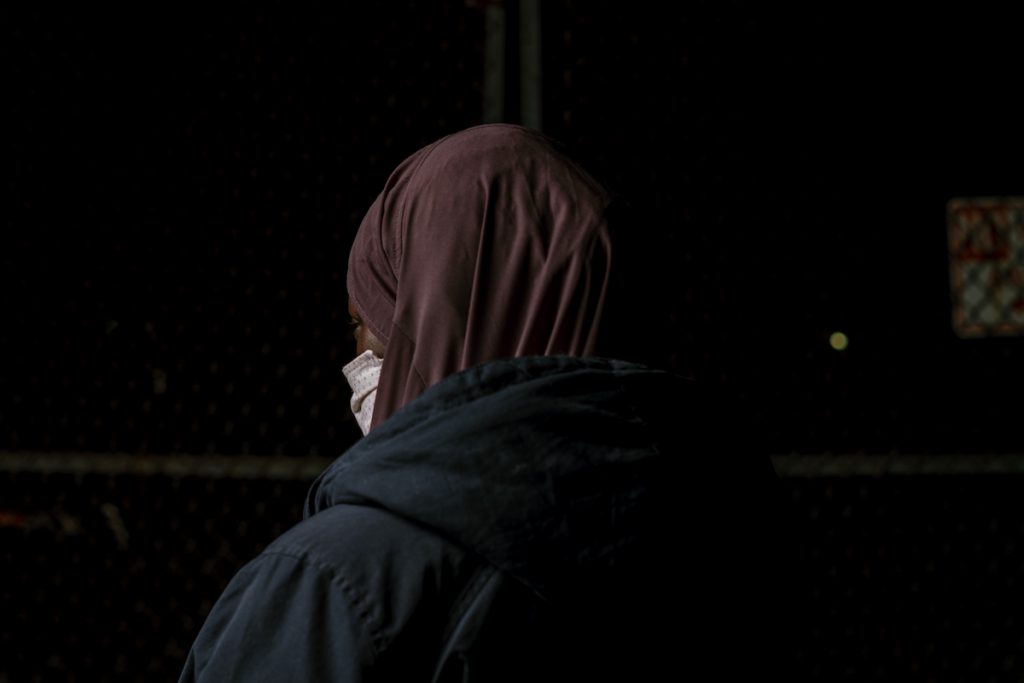
Life as an FBI Informant
After Fatma agreed to work with the FBI, the agents would show up unannounced at her door, and her newborn son would panic. He’d ignore the agents while they asked Fatma questions. “Your son is very straight-faced, like his father,” one agent remarked. “He’s smiley with me, maybe he doesn’t like you?” Fatma responded.
Until he was about 2, Fatma’s son would run away any time there was a knock at the door. His trauma largely stemmed from the first few months after Fatma was taken to 26 Federal Plaza.
Every week, the agents would loudly bang on the door each time they arrived, Fatma said. They would call her randomly from different phone numbers. Her roommates started complaining and said they were going to move out if this continued.
“Life was horrible,” Fatma said. “I had to be strong for my child so he can grow up normal in these abnormal circumstances.”
The agents would question Fatma for around two hours every time they showed up, Fatma said, always asking the same questions in different ways.
Are you pro-ISIS?
Are you a moderate Muslim?
Are you an extreme Muslim?
Do you issue fatwas?
If people need Islamic guidance, do they come to you?
After six months, the FBI started issuing Fatma assignments. They gave her a list of names and told her to start gathering information about individuals in Ghana who had traveled to Syria. They would give her the target’s Facebook account or other means of reaching them. One of the people told her that the organization she had helped found had played no part in his decision to go to Syria.
“I’m done,” she thought, overcome with joy. This had to prove her innocence. But when she told agents, they told her to keep digging and find out how the person sent money back and forth.
Soon, the FBI started asking Fatma to message people she had never heard of before. People in the U.S., in the U.K., in Canada. They wanted her to get to know them, to find out what made them tick. Figure out if people were intending to travel to Syria to join ISIS, ask for their opinion on America, the agents advised. Fatma said the agents would try to get her to coerce the people into saying incriminating things.
To give Fatma an assignment, two or three agents would typically show up at her house, explaining who they wanted information on next.
“There were so many times, I would look in the mirror and I would say, ‘What have you become?’” Fatma recalled. “There were so many times I said, if I didn’t have my son, it was just me and my husband, I would’ve chosen deportation.”
The agents would sometimes be encouraging, telling Fatma she was helping herself stay in America, she recalled. Other times, they threatened to deport her. And if she was deported, the agents said they had told the Ghanian government they didn’t trust her, meaning she could be arrested when she got back.
Deportation might also mean Fatma would be separated from her child, who was born in the U.S. The agents often said they would take her child away from her. “Your son belongs to us. He’s a U.S. citizen. You’re an immigrant,” Fatma recalled the agents telling her.
The fear of being separated from her child made Fatma capable of doing things she couldn’t believe. “I didn’t know who I was anymore. I had to enter people’s minds, invade their personal space,” she recalled.
The work also placed a strain on Fatma’s marriage. Malik’s grandfather was very sick and was in desperate need of medicine his family could not afford. They were waiting on Malik to send money, but there was a hold on his Western Union transactions, which he and Fatma suspected the FBI was behind. Malik said he called the FBI to ask what was happening. They showed up and consoled him, but ultimately did nothing. Malik spent months trying to wire money, but his grandfather eventually died. His family was furious, and his uncle did not speak to him for months.
“Until this day, I can’t send money back home,” Malik said.
Malik was distraught and came home crying to Fatma when he got word that his grandfather had passed. “I felt like I caused this to his family,” Fatma said. “Maybe your life would’ve been better if you married somebody else, you married me and I came with all this baggage,” she told her husband.
Fatma’s friends and family were also starting to ask questions. Her husband had a green card and had been in the U.S. for ten years, why didn’t he just sponsor her so she could work? She told people she was enjoying being a stay-at-home mom, but people close to her were skeptical. It was out of character.
The Immigration Courts
In early 2017, Fatma checked the mail and found a letter from the Department of Justice. It was a notice instructing her to appear in immigration court in November. She was confused and furious. “I thought they said there would be no court?” she said to her husband, recalling her agreement with the FBI.
While Fatma said the FBI told her she would have her immigration status rectified without a court visit, agents never agreed to give her those terms in writing. It was unsafe, the FBI said, as anybody could get their hands on the agreement and expose their work. Her FBI contacts told her not to worry about the hearing and they would make it go away. But a month before the scheduled hearing, Fatma received a phone call from the immigration court notifying her that she had to appear or face deportation. The agents assured her this was merely procedural, and that they would come to the hearing with her to make sure everything was OK.
In Nov. 2017, Fatma returned to 26 Federal Plaza to attend her hearing before Immigration Judge Amiena Khan. Two FBI agents accompanied Fatma, Malik, their son and newborn child to the courtroom, but scattered to different seats to blend in with the other immigrants who were waiting for their chance to speak to the judge. Fatma was called up first because her newborn was crying.
Judge Khan assessed Fatma’s case and thought it was pretty straightforward: her husband had a green card, they could file for a marriage petition to regulate her status, Fatma recalled. She just needed an attorney, the judge told Fatma. Khan scheduled another hearing for July 2018 and told her to find one.
The agents stayed silent throughout the hearing. But as they left together, they told Fatma not to worry; she wouldn’t have another hearing.
In June 2018, one month before her next hearing, Fatma got a notice in the mail: she had received Deferred Action, one of the tools at the FBI’s disposal. Thinking that would be the end of it, Fatma called the immigration court to see if her hearing was still scheduled. It was. The FBI again assured her it would be fine. The Trump administration had hired a bunch of new ‘clerks,’ they said, and the one they had been working with had been fired.
At the July hearing, Fatma told Judge Khan that she hadn’t been able to locate an attorney yet, so Khan agreed to give her one more chance and set a new hearing for February 2019. “Please get an attorney,” Khan told Fatma.
The FBI’s promises to ease Malik’s citizenship application were also not working out. He had an interview with the U.S. Customs and Immigration Service in August 2017 where they kept him for six hours and asked if his wife was a terrorist. Again, the FBI said his case would be fine, it was just the Trump administration’s policies that were making things difficult, Fatma recalled. Malik had another interview in August 2018 that was more cordial.
But in December 2018, Malik received a letter saying USCIS could not make a decision on his citizenship application.
Fatma was fed up. She decided to take matters into her own hands. She called the immigration court in January to see if her hearing was still scheduled. Once again, it was. This hearing, she decided, would be different. Each time the agents had promised they would speak to the judge and explain the situation, this time Fatma would explain it herself. She wrote a letter that she planned to give to Judge Khan that detailed everything she was going through, and if the agents stayed silent again, she would give Khan the letter.
Once again, Fatma arrived at the immigration court in February 2019 with her family and two FBI agents. One agent sat next to her while they waited for Fatma’s name to be called. Eventually, Fatma was brought forward, and Khan seemed confused. Why didn’t Fatma have an attorney?
Fatma looked back at the crowd, but the FBI agents looked away. “Young woman, it appears there is something you want to tell me. Shall I clear the courtroom for you?” the judge asked.
“Perfect, your honor. Can we go off the record?”
Judge Khan cleared the courtroom and everyone except the two FBI agents left. Fatma was initially excited, as she thought the FBI agents would finally speak up for themselves. “Your honor, they have something to say,” she told Judge Khan. But the FBI agents declined.
“Your honor, I was made to understand this case was going to be closed today,” Fatma explained to Khan.
“I really want to close your case, because it does not make sense,” Khan replied.
“Your honor, I have a letter for you,” Fatma said.
Judge Khan took it and began reading.
“Dear Judge Khan, It is with much humility that I am writing to you,” the letter began. “I have been an informant for the FBI since 2015. I was promised that there will be no court proceedings.”
“Now I know exactly where we stand. This is a unique case,” Khan said.
“I understand you are government officials?” Khan asked the agents in the room. “Are you with the Federal Bureau of Investigation?”
“Yes, your honor,” they replied, before they asked Fatma, “What did you give her?”
“I think we all want to close this case so if you can give me any verbal statement that you want to close this case, with the trial attorney seconding it, I’m going to close this case right now,” Fatma recalled Khan saying.
Fatma was ecstatic, thinking the case would finally be over.
“We can’t do that,” one agent said. They wrote something and gave it to the prosecuting ICE attorney.
Nobody provided any confirmation, so Khan said if anyone at the FBI contacted her directly in writing and stated they wished to close Fatma’s case, she could close it. The ICE attorney responded that they didn’t have Fatma’s file, so they would need to schedule another hearing, which was set for November 2019.
After the hearing, the FBI vanished for three months. When they finally contacted Fatma again, they said they’d tried and failed to reach the ICE attorney. Maybe it was time for her to get an attorney, they said.
Also Read: Muslim Families Continue to Struggle Due to Travel Ban
Building a Legal Team
Fatma could not believe after four years, the FBI was telling her to get a lawyer. On countless occasions in the past, they had told her getting an attorney would be a waste of time, that she would be fine without one. She was done with the FBI. “Now you want me to get an attorney after four and half years of doing this? Now you’re showing your true colors. Don’t ask me to do anything!” she thought.
Finding an attorney proved more difficult than Fatma anticipated. When she shared her story, attorneys said they were afraid of getting on the wrong side of the FBI. But Malik had been talking with an attorney named Claire Thomas, the director of the asylum clinic at the New York Law School. She was working on the case of his roommate, who did not speak English. Thomas would text Malik to help schedule their appointments.
Thomas had never dealt with any FBI informants in her career as an immigration attorney. She knew a little bit about Fatma’s case and said she thought it would be relatively straightforward: a visa overstay that needed a marriage petition. It was the type of case she would have to refer to a private attorney, but she agreed to meet with Fatma and Malik since he had been so helpful. She planned to dutifully listen and then provide a list of private attorneys they could contact.
“This is a lesson I teach my students,” Thomas said. “You never know what someone is going to say.”
Fatma came to her office with Malik and her two children in October 2019. Unlike her husband and his roommate, who were both very stoic, Fatma was very chatty and warm, Thomas recalled. They had a long walk to Thomas’s office from the university’s entrance, during which Fatma peppered Thomas with questions about law school. They arrived at her office and sat around her L-shaped desk. Malik and Fatma sat down while their two young children played on the floor.
“Ok, Ms. Claire, I have this problem with immigration,” Fatma said. “I’ve been an FBI informant for the past five years.”
“Very few things shock me as an immigration lawyer or teacher. I’ve heard a lot of things over the years,” Thomas said. “But this shocked me differently, and also at the same time, the children are smushing cheesy puffs into the floor.”
After hearing the whole story. Thomas decided to take on her case. Three things needed to happen: Fatma wanted to break up with the FBI, they needed to complete a marriage-based petition for her husband, and Thomas had to attend a hearing in immigration court Fatma scheduled for the following month.
Thomas felt confident she could handle the immigration work, but she’d never negotiated an exit for an informant working with the FBI. But she had heard of an organization that had: the Creating Law Enforcement Accountability & Responsibility (CLEAR) Clinic at the City University of New York law school.
Founded by Professor Ramzi Kassem and his students in 2009, CLEAR provides legal support for people who have been targeted by the federal government for national security and counterterrorism reasons. They successfully sued the New York City Police Department over its practice of spying on Muslim New Yorkers in the wake of 9/11, and had experience working with people who were in Fatma’s position. They recently won a landmark case against the agency, which let three Muslim men sue federal agents for damages after they were placed on the no-fly list when they refused to serve as FBI informants.
CLEAR’s Senior Staff Attorney, Naz Ahmad, received an email from Thomas telling her she had met a woman who worked as an FBI informant, and the group agreed to help extricate her from the FBI.
Fatma went from fighting her and her husband’s case alone to having two teams of lawyers backing her. Now she was ready to cut her ties with the FBI once and for all.
Also Read: Increase in Demand for Muslim Funeral Services in Queens
Divorcing the FBI
The first step was Fatma’s November 2019 immigration court hearing. Thomas partnered with Carlos Valenzuela, a private attorney and former student of hers. He was very willing to work on the case after he’d read about the case of a 17-year-old on Long Island who had agreed to work with the FBI, only for them to deny having worked with him when the case came to immigration court. “It was ill-spirited behavior from the agency,” Valenzuela said.
Judge Khan was glad to see that Fatma now had attorneys, and this time there were no FBI agents in the room. But the ICE attorney did not agree to terminate the case, and Fatma had received a renewed Deferred Action in June for one year. Judge Khan set another hearing for September 2020, which was canceled due to the pandemic. Malik had received a rejection on his citizenship application a few months prior to the hearing, so they were working with another lawyer on appealing that.
Now that her immigration case was on the right path, Fatma set about the next step: divorcing the FBI. They had not been in touch in a while.
“We were thinking about the best way to get her out and we were also thinking about ways to bring some transparency on the situation,” Ahmad explained. But they did not want to force a meeting with the FBI unless they reached out first. In January, they did. Fatma received a call from an agent saying they wanted to meet with her to get a phone they had given her back.
For most of CLEAR’s history, it had extricated clients from the FBI with little fanfare to protect their legal interests and their privacy. FBI informants often do not wish to have their names publicized for fear of retribution. But recently, CLEAR has sought to bring people who are caught in this quagmire into the public eye. They decided to use a new tactic: They would confront the FBI as a community.
“It’s a way for people who have been feeling very isolated, they don’t have anyone to talk to about this, to feel supported in their decision to stop,” Ahmad said. “And it sends a broader message to law enforcement that we’re not going to stand for this, ‘We know that you’re using informants, and we’re not going to stand for that. We’re going to accept this person back into the fold and we’re not going to let you sow division between us.’”
Fatma would meet the agents along with her new lawyers, some friends, and supporters from community and activist groups. I was also invited to witness.
On a freezing January morning, Fatma gathered with Ahmad, Kassem and Princess Masilungan, another CLEAR attorney. They told the FBI to meet them at a park near Fatma’s apartment. Several of Thomas’s students who were working on the case joined the park meeting along with students from CLEAR. The group was nervous and excited. “What if they don’t show up?” Fatma worried. The attorneys at CLEAR were meanwhile concerned about startling the FBI with the group, as the agents are usually armed.
The agent called Fatma, and Ahmad picked up the phone to let them know that Fatma would be accompanied by her legal counsel. After 10 freezing minutes spent waiting in the park, the agents eventually pulled up in a Toyota Camry with tinted windows. A woman and man strolled into the park, both wearing blue jeans. The blonde-haired woman looked nondescript with a purse and long black winter coat, while the man wore a windbreaker and a skullcap beanie.
Fatma, her husband and the CLEAR lawyers approached the agents, while everyone else stepped away and sat at a bench out of earshot of the conversation. They had what appeared to be a cordial conversation for about 20 minutes. Cards were exchanged. And as the agents walked away, the woman appeared to snap a picture of the people sitting at the bench.
Everyone regrouped afterward. Fatma was visibly relieved. “They didn’t see this coming,” she said.
“She had no poker face,” Masilungan added, referring to the way the woman agent’s face had dropped when she saw the group.
The agents said that they have nothing to do with immigration cases and couldn’t affect them. This infuriated Fatma. She told them how she felt: “This relationship is over, I don’t want to talk to you anymore. If you want to talk to me, you’ll have to go through my lawyer.”
CLEAR attorneys told the agents they would give over the phone eventually following an exchange of letters with an FBI lawyer. It was yet another point that made the female agent’s face drop.
After they left, Fatma went straight to the mosque and thanked God that she had made it. “I’ve been waiting for this day for so many years. So many people told us that there is no way out of the case.
“I feel like I have my life back.”
*Fatma and her husband’s name have been changed to protect their safety for fear of retribution
Editor’s note: The majority of the information shared in this piece was corroborated using documentation provided by Fatma and her lawyers and secondary accounts. However, there are certain portions of the account that rely solely on Fatma’s memory. Those portions are attributed to Fatma.
